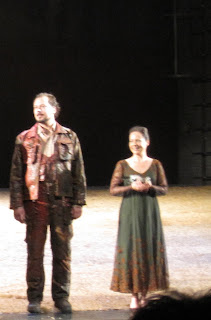Siegfried was the evening of our half day trip to Shouzou and Gotterdammerung the day after. Remember this was a four day Cycle, which is nice if you want the compression and intensity, but can be rather overwhelming and other-things-exclusive. And it must be difficult, if not imprudent, for the big sings. In Shanghai, only Siegfried was split cast, with Stig Andersen singing in Siegfried (replaced at short notice by Alfons Ebertz in the second run), and Lance Ryan (with a day off after his Siegmund) taking on Siegfried in Gotterdammerung. I had been to another four day Ring in Budapest, but there the biggies (Wotan, Brunnhilde, Siegfried) were all alternately cast.
Going in the other direction is Manchester, splitting operas into two nights, next year with Walküre (with Stig Andersen by the way), as they've already done with their Gramophone Opera of the Year Gotterdämmerung with that experienced vocal actor Peter Coleman-Wright. I fail to see what that's all about - revenue?
Perhaps our day trip was a mistake, but Siegfried dragged. It really shouldn't. Siegfried deals with some of the most mythical magical aspects of the whole cycle - clues to the heroic and links to truth that are too easily overridden in an attempt at coup de theatre stage wizzardry (the dragon) or ignored when it becomes too hard or just unfathomable (the woodbird). And with music of incredible descriptive beauty.
Stig Andersen took a blustery approach dramatically and musically and facing off against the well sung though very young, and nice looking, and particularly nice sounding, Mime of Martin Koch, it became a struggle in suspension of disbelief which beat at least me. Age and physique isn't the issue, but rather the approach. By far the most satisfying Siegfried I've experienced was the rather large and lumpy Ben Heppner who so vocally infused the character with innocence and wonder (rather than attempting physical youthfulness), with tenderness and beauty (especially in his encounter with the woodbird, as Sieglinde in white dove coloured dress appears in the forest in a moment of revelation I still get emotional about when remembering), that whatever else you were looking at, you heard young and saw young.
As usual, there were great moments. Jutta Böhnert sang an (off stage) Forest Bird of brilliance and joy with not the slightest hint of strain or discomfort, and thankfully more than enough to discount the silly dead parrot routine on stage. The other was Ante Jerkunica's brooding doomed masculine, and dare I say sexy, Fafner.
(Ante Jerkunica, Fafner with Jutta Böhnert, Forest Bird)
Gotterdämmerung was the most specifically placed, 1950's east of the wall, in an extension of the militarism already seen in Walküre. Here Kurt Rydl's wide vibrato was more a plus, adding another dimension to the size and malice of his Hagen. Oliver Zwarg was back ghosting the stage, at once a creepy and beautifully sung haunting Alberich. Samuel Youn was a commandingly certain, and certainly dark, Gunter and Astrid Weber an especially pretty Gurtrune.
With slow tempi from Marcus Stenz, there was little sense of acceleration to the raison d'être for the whole 15 hours - Siegfried's death. And because of big scene changes, some interludes (Siegfried funeral march) were played in front of the bronzed fire/safety curtain, which only tended to draw attention to the lack of orchestral weight (admittedly we were close and losing a lot of body from the strings most likely) and just broke whatever momentum there was even more.
More significantly, with the 'curtain' down behind her, Catherine Forster's Brünnhilde ended up not much short of a recital, as she went for it alone for the great immolation scene. And this she did magnificently. The voice was huge (a sound board right behind) and she was glorious, pouring forth fearlessly, attacking it with apparent ease and confidence, a light-golden smooth edged warm voice perfectly centered, and left to her own devices (standing still and singing was her best tactic) and with considered suppport from the pit (Stenz's support for the singers has been exemplary and generous the whole Ring), she brought the whole Cycle to a hair raising end. She had, as they say in the classics, sung the shit out of it.
(Catherine Forster, Brünnhilde enjoying her well deserved ovation)
The final scene, as the curtain lifted, was of an already burning and smoldering Valhalla, retreating into the distance, as rain started to fall, leaving an open vacant golden cubed space with soft clouds above. The house went nuts.
The Russian gentleman next to K thought it was all a 'bit modern, but fun'. That's not a bad summary. It was certainly fun, and the kind of experience I absolutely love. The great Ring Cycle, from a German house and a Canadian producer, staged lock stock and no helmets in a fantastic oriental city. We slipped into the night for the fourth and last time.



No comments:
Post a Comment